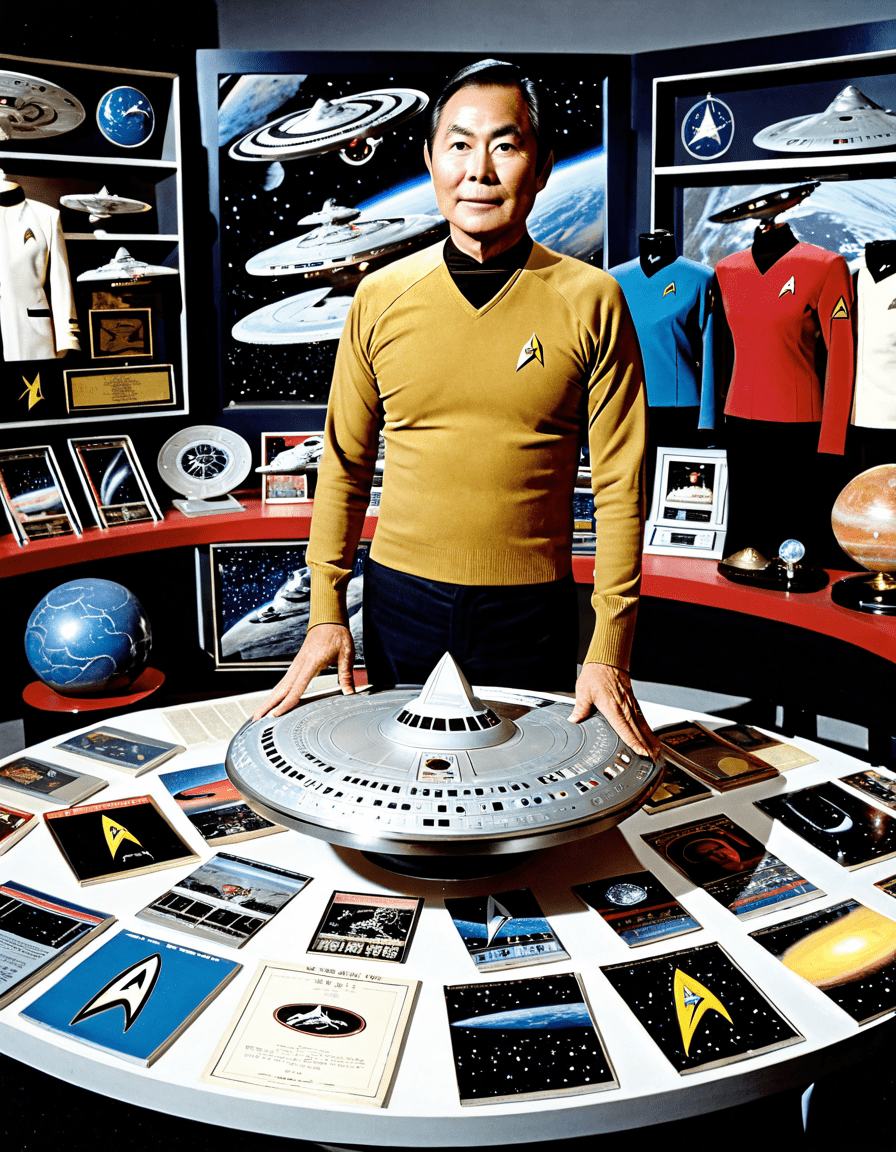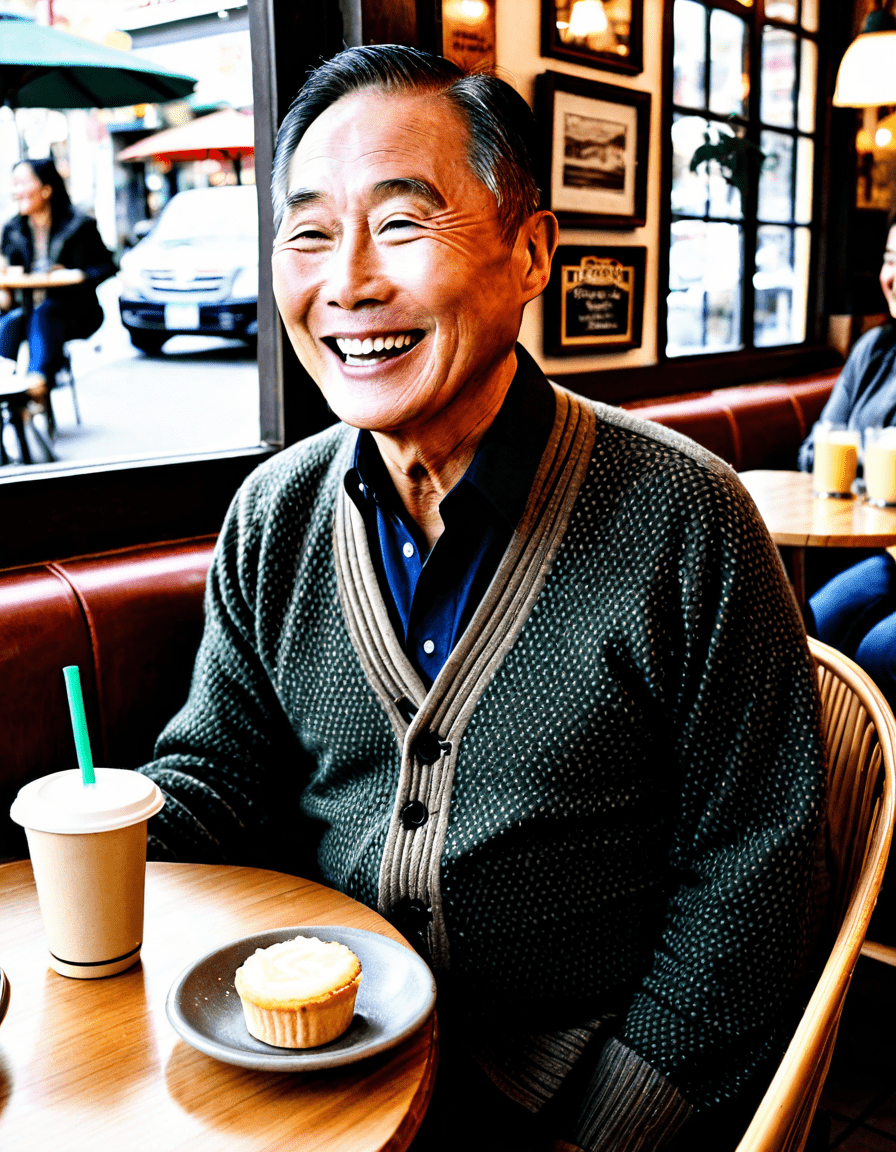
The Rise of George Takei: Breaking Barriers in Hollywood
George Takei’s journey is one that echoes resilience and determination. Born on April 20, 1937, in Los Angeles, California, Takei’s childhood took a dramatic turn during World War II when his family was forced into a Japanese American internment camp. This harrowing experience shaped Takei’s worldview and later fueled his activism as he became a vocal advocate against injustice, making him not just a beloved celebrity, but also a pivotal social figure.
When George Takei stepped into the role of Hikaru Sulu in the original Star Trek series, it wasn’t just another role. He became the first Asian American to play a significant character in a major American television series, breaking cultural barriers and setting the stage for better representation in Hollywood. His charisma and skill as an actor not only entertained audiences but resonated on a deeper level, prompting discussions about diversity that were long overdue in the film industry.
As Hollywood transformed over the decades, so did George Takei’s approach. He continuously challenged stereotypes, urging for characters and plots that accurately represent marginalized communities. His journey mirrors the evolution of American society itself, proving that storytelling can influence change.

Top 5 Influential Moments in George Takei’s Career
Takei’s performance as Sulu wasn’t just memorable; it was revolutionary. In a time when Asian characters were often sidelined or reduced to stereotypes, George Takei brought dignity and depth to Sulu. His character is celebrated for not only being a skilled officer aboard the USS Enterprise but also as a testament to the show’s commitment to a more inclusive narrative.
In an inspiring twist, Takei came out as gay in 2005 at the age of 68, making waves in a society that was still grappling with LGBTQ+ rights. His openness about his sexual identity catapulted discussions about gay representation in a largely heteronormative Hollywood, ultimately paving the way for other celebrities. Takei’s voice became synonymous with activism, fighting tirelessly for LGBTQ+ rights and equality.
With the rise of platforms like Facebook and Twitter, George Takei embraced social media, connecting with a younger audience eager for engaging content. His well-timed humor and insightful commentary have attracted millions of followers. Whether he’s discussing social issues or sharing lighthearted memes, Takei enriches online discussions, making activism approachable and relatable.
George’s interactions with figures like Jim Belushi, and podcasts such as Joe Rogan’s, spotlight his relevance in modern pop culture. These collaborations shine a light on his experiences, emphasizing the importance of representation not just in film, but in comedy and storytelling. Takei’s discussions with different celebrities keep conversations around diversity alive and relevant.
Beyond his iconic role in Star Trek, Takei’s work in theater and documentary films, like To Be Takei, reveal the multifaceted contributions he’s made to cultural dialogue. From Broadway productions to public speaking engagements, he has consistently used his platform to advocate for justice, liberty, and inclusivity. Takei’s commitment to education and outreach inspires countless individuals to stand up and speak out.
The Intersection of George Takei and Roman Polanski: A Study of Disparate Navigations in Hollywood
When we look at icons like George Takei and Roman Polanski, we see two very different narratives unfolding in Hollywood. Takei represents resilience and positive activism, using his fame to bring about meaningful change. In contrast, Polanski’s story has been mired in legal troubles and a contentious legacy overshadowed by allegations.
Takei has always harnessed his influence for good, advocating for human rights and educating audiences about the struggles he faced. Meanwhile, Polanski’s complicated history raises questions about moral accountability in the entertainment industry. As we weigh both figures, we must ask ourselves what we value in our heroes—whether it’s groundbreaking contributions to social justice or the ability to separate the art from the artist.
The divergence between Takei and Polanski’s paths serves as a reminder of the dual narratives that can exist in Hollywood. While Takei fights tirelessly for acceptance and equity, Polanski’s legacy challenges us to examine the moral complexities artists face. Such discussions can shape our collective understanding of accountability in entertainment.
Bridging Generations: George Takei’s Lasting Influence on Today’s Cultural Landscape
George Takei has transcended generations, engaging in vital conversations about race, sexuality, and celebrity. He’s not just a relic of the past; he’s a dynamic voice in contemporary dialogue. Recent podcast appearances, including those on Joe Rogan’s show, reveal a growing trend where celebrities tackle hard-hitting social issues openly.
Jim Belushi frequently references Takei in his work, advocating for diversity in storytelling and comedy. This interaction between past and present stars exemplifies how Takei’s influence remains relevant in today’s cultural discussions. His ability to blend humor with advocacy makes powerful messages accessible to the masses.
In today’s constantly evolving celebrity culture, Takei stands out as an example of how visibility can drive change. His story inspires a new generation of activists, filmmakers, and entertainers who strive to create work that reflects a more diverse society. George Takei embodies the idea that effective storytelling can ignite social change, motivating others to follow suit.
A Legacy of Activism and Representation
At the heart of George Takei’s narrative lies not just his rise from an internment camp to a legendary status in Star Trek, but a compelling story of overcoming adversity and advocating for those less represented. His legacy encompasses more than outright fame; it embodies the pursuit of equality and justice in Hollywood and beyond.
Takei’s visibility reminds us of the vital importance of representation in all areas of society. He stands as a beacon for those who strive to speak out against injustice, illustrating that success is measured by the courage to advocate for others. His journey compels us to recognize and confront our own biases, encouraging a future where stories reflect the diverse lives we lead.
As we celebrate George Takei, we acknowledge him as more than just a Star Trek icon; he is a powerful agent of change—a catalyst provoking thought and inspiring action. His narrative resonates with anyone who believes in the power of storytelling to foster understanding and empathy. In essence, George Takei’s journey is a testament to the transformative impact of a life dedicated to activism and representation.
George Takei: Fun Trivia and Interesting Facts
A Star Is Born
Did you know that George Takei wasn’t always the iconic figure we know today? His early years were riddled with challenges, particularly during World War II when he and his family were placed in an internment camp. This part of his life sparked George’s passion for civil rights activism. Just as Eva Longoria’s influence in the entertainment industry showed that voices can amplify change, Takei believes in using his platform for significant societal impacts. If you ever wondered about the strides TV shows like Ncis new orleans cast make in broadening representation, George Takei is a prime example of how far one can go after overcoming adversity.
The Voice Behind Sulu
When it comes to voice work, George Takei has lent his talents to various animated series and video games. His baritone voice has been featured in popular projects, much like how Faune Chambers Watkins has taken on varied roles to showcase her diverse talent. Interestingly, you can catch Takei’s voice in the Star Trek video games, adding layers to beloved characters like Sulu and immersing fans in the universe he helped create. It’s amazing how these iconic characters continue to captivate audiences, evoking nostalgia, much like Michael J. Fox manages to do with his classic roles.
More Than a Star
George Takei’s contributions aren’t limited to acting. He’s also a prolific author and public speaker. His graphic memoir, They Called Us Enemy, reveals the struggles he faced during his youth and encourages discussions around prejudice and acceptance. This resonates with those familiar with the works of Louise Penny, whose storytelling often shines a light on complex social issues. Moreover, Takei’s witty online presence has garnered him a massive following, proving that humor can effectively raise awareness. Just like the buzz around upcoming Best Black Friday Deals 2024, Takei keeps the excitement alive among his fans and followers with every post and interaction.
In the world of entertainment, George Takei stands out not just for his on-screen roles but also for his lifelong dedication to advocacy and education. Whether you’re catching up on the Elsbeth cast or reminiscing about the original Star Trek, it’s clear that Takei’s journey is a testament to resilience, joy, and the transformational power of storytelling.





